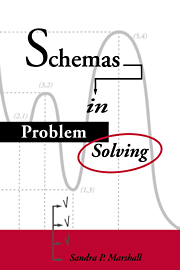Book contents
- Frontmatter
- Contents
- Preface
- Acknowledgments
- I Fundamentals
- II Schemas and instruction
- III Learning from instruction
- 6 Learning and schema theory
- 7 Learning from schema-based instruction
- 8 The acquisition of planning knowledge
- 9 The diagram: Marker and template
- IV Schemas and assessment
- V Schema models
- Notes
- References
- Name index
- Subject index
6 - Learning and schema theory
Published online by Cambridge University Press: 22 October 2009
- Frontmatter
- Contents
- Preface
- Acknowledgments
- I Fundamentals
- II Schemas and instruction
- III Learning from instruction
- 6 Learning and schema theory
- 7 Learning from schema-based instruction
- 8 The acquisition of planning knowledge
- 9 The diagram: Marker and template
- IV Schemas and assessment
- V Schema models
- Notes
- References
- Name index
- Subject index
Summary
As one might expect, cognitive science has had a significant impact on research about learning, and learning today is usually studied in one of two ways: by detailed studies of individuals (rather than groups) and by computer simulation. The most informative studies employ both approaches, drawing on the human studies for observable responses and using the computer simulations to evaluate nonobservable ones.
Cognitive science also deserves some of the credit for shifting the content of learning research from artificial and/or superficial stimuli to meaningful topics. Much of what we think of as traditional learning theory was derived from the behavior of subjects in laboratory settings. The learning to be studied usually took place in a very short period of time, perhaps 15 minutes to 1 hour. Its content was often nonsensical or irrelevant, because the research paradigm called for the use of material of which subjects had no prior knowledge. Hence, much of the learning that learning theories explained was not functional learning as we see it in the world, and predictions from these theories often were in conflict with observations made in other settings such as the classroom. Many of the aspects of learning that we now find worthy of study were deliberately and systematically eliminated from these studies. With the emergence of new methods of investigation and a strong emphasis on meaningful topics, the study of learning has advanced in several fresh directions.
- Type
- Chapter
- Information
- Schemas in Problem Solving , pp. 171 - 183Publisher: Cambridge University PressPrint publication year: 1995



